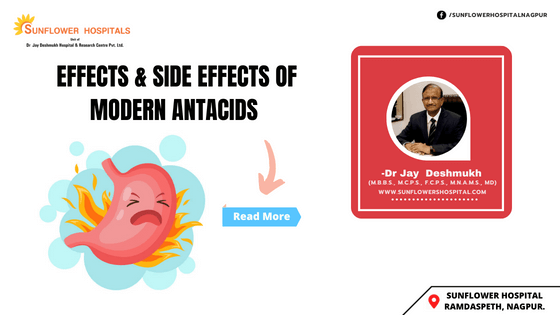What do conventional antacids do?
The ones that are commonly used contain Aluminium, Magnesium, and Calcium salts of various types and in some combinations. They neutralize the acid formed in the stomach and the one that passes to the oesophagus, causing heartburn. Be sure that a cardiac issue mimicking heartburn is not missed. These antacids are given on a short-term basis for symptomatic relief. Some antacids may contain excess Sodium, and hence should be avoided in heart disease and hypertension. In patients with kidney disease, excessive Aluminium intake can cause aluminium toxicity. Some may retard the absorption of certain medications like Iron or Thyroid.
What are H 2 blockers?
These are drugs that prevent the formation of acid. They block the production of acid in the gastric cells. They do not block H 1 receptors that are blocked by anti-allergic medications. The drugs in this class are Ranitidine and Famotidine. They can be used on a long-term basis. Side effects are very minimal. Some may complain of fatigue, diarrhoea, headache, constipation, muscle pain and drowsiness.
What are Proton Pump inhibitors?
They are better than H₂ receptor blockers. They are better suited for acid reflux disease. This is because Proton Pump inhibitors are better at preventing the production of acid in the stomach. The commonly used drugs in these classes are Omeprazole, esomeprazole Pantoprazole, Rabeprazole and a few more.
What are the side effects of PPI?
They are being increasingly used in the last decade and emerging data suggest certain concerns, though these
have been observed. Micronutrient deficiency of B12, Calcium, Iron, and Magnesium have been Dom. mented. Increased incidence of pneumonia and Clostridium difficile infection is reported.
What are the precautions that you need to take before starting antacids?
Antacids are used to treat hyperacidity, and heartburn and heal ulcers. These include the conventional ones that are available in tablets and liquids. These are Calcium, Magnesium, and Aluminium salts. The other group is Histamine 2 receptor blockers like Ranitidine or Famotidine and the third is Proton pump inhibitors like Omeprazole, Omeprazole and many more. These are observational studies only. The combination of less acid and more gastrin increases the risk of gastric cancer. They are known to cause acute interstitial nephritis, and some individuals may go in for chronic kidney disease. Some increases in the risk of fractures in elderly women and frequent falls have been reported. Some studies have reported an increased risk of dementia. Certain adverse effects of chronic liver disease. Always start with the smallest dose and for the shortest duration. Be careful in individuals who are on Iron, Clopidogrel, Warfarin or those with chronic liver disease. Some PPI can cause acute kidney injury, and hence some degree of vigilance is required.
How to handle hyperacidity in pregnancy?
Eat several small meals throughout the day instead of three large ones. Limit caffeine,
spicy food and painkillers. Drink water in between meals, but not with meals. By simply modifying your diet by consuming yoghurt and milk, you can get adequate relief. Keep the head end of your bed higher than the foot end. Be sure to take the advice of your doctor before any medication is started. Certain hormonal changes, relaxation of the lower part of the oesophagus by progesterone and enlargement of the uterus contribute to acid reflux in pregnancy.
What has been learnt about antacids in the last few decades?
Antacids are known to doctors for the last 100 years. What we have learnt is there is a difference between healing ulcers and symptomatic relief. Pure liquid antacids may give you symptomatic relief, but do not heal ulcers. PPI and H 2 blockers heal ulcers. Most of them are given on a long-term basis. In patients where there is no appropriate relief in a few days or those willing or those with atypical symptoms, an upper gastrointestinal endoscopy is essential. Antacids appear to be the simplest of all drugs, next only to vitamins. There are specific indications for most of them. Long-term administration of these drugs has greatly reduced the need for surgical procedures. However, long-term administration and certain drug interactions are throwing newer challenges in their administration.
Author: Dr Jay Deshmukh
Dr Jay Deshmukh is Chief Physician and Director, Sunflower Hospital, Nagpur Honorary Physician to Honorable Governor of Maharashtra and PondicherryCentral. Dr Jay Deshmukh is an M.B.B.S., M.C.P.S., F.C.P.S., M.N.A.M.S., MD From Internal Medicine – Bombay and New Delhi.


